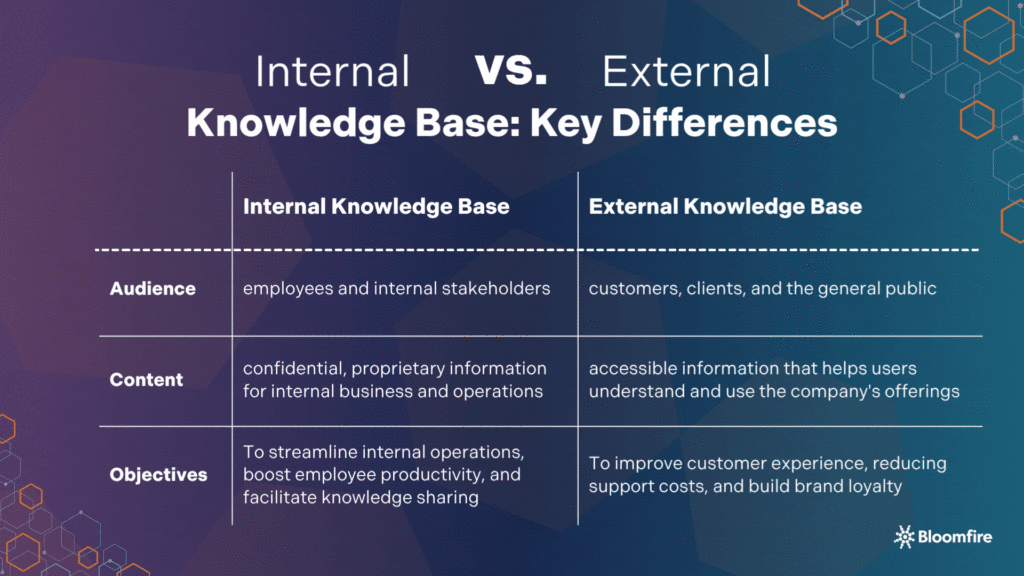Internal vs. External Knowledge Base: What’s the Difference?

At the heart of knowledge management are knowledge bases, which can be categorized as either internal or external. Knowing the distinction between these two types is essential for organizations aiming to optimize their information search strategies.
An internal knowledge base is a centralized repository of information designed for use within an organization. It typically includes in-house knowledge such as company policies, employee handbooks, training materials, and proprietary data.
On the other hand, an external knowledge base serves as a resource for customers, clients, or the general public. This type of knowledge base includes FAQs, product guides, troubleshooting tips, and other resources that help users understand and interact with a company’s offerings.
In understanding internal vs. external knowledge base, you must assess your specific needs and goals, as both serve different purposes in equally important ways. Here’s what you need to know to determine which will add the most value to your organization.
Key Differences Between Internal and External Knowledge
While both internal and external knowledge bases serve important functions, they differ in terms of audience, content, and objectives. Recognizing these differences helps organizations tailor information delivery to specific user needs. This strategic approach ensures that the right information reaches the right people at the right time, maximizing its impact.

Audience:
- Internal knowledge base: Primarily targets employees and internal stakeholders.
- External knowledge base: Geared towards customers, clients, and the general public.
Content:
- Internal knowledge base: Includes confidential and proprietary information tailored to support business operations and internal processes.
- External knowledge base: Features publicly accessible information that aids users in understanding and using the company’s products or services.
Objectives:
- Internal knowledge base: Aims to streamline internal operations, enhance employee productivity, and facilitate knowledge sharing.
- External knowledge base: Focuses on improving customer experience, reducing support costs, and building brand loyalty.
Understanding this strategic alignment related to internal vs. external information search ensures that knowledge initiatives directly support business objectives. It also maximizes the value derived from information assets, leading to improved decision-making and operational efficiency.
What Is An Internal Knowledge Base (IKB)?
An internal knowledge base gathers, stores, and shares knowledge within your organization. This would be the knowledge your team needs in-house to perform their jobs to the best of their ability.
It can include exclusive information or insight into your customers and their typical behaviors so employees from all departments can better target and personalize their experience at every consumer touchpoint. It can also include step-by-step processes, policies, product or company updates, and other formal documentation.
An internal knowledge base can also be used to capture and share unique experiences and skills across teams in an otherwise impossible capacity, and quickly lost when an employee moves on from the company. The type of knowledge captured and shared includes tacit and explicit.
Tacit knowledge is the valuable knowledge one can’t easily describe in words (learned only through years of hands-on experience), while explicit refers to knowledge that is more easily documented. On the other hand, explicit knowledge is often found in manuals, procedures, and databases, making it readily accessible and transferable.
Who Uses An Internal Knowledge Base?
Your entire organization can benefit from an internal knowledge base. However, these departments find it particularly important to their day-to-day duties. It empowers them with quick access to vital information, leading to more efficient workflows.

Call centers
An IKB is crucial to supplying call center representatives with the information they need to help customers resolve their problems and create a meaningful and positive experience. It is accessible to employees only, and support agents can use it to quickly look up relevant information to assist customers on calls. This will increase customer satisfaction and streamline the call center’s processes and procedures.
Human resources
HR is responsible for a wide range of important duties, such as managing payroll, handling disciplinary actions, and finding and recruiting the right hires. They are also primarily responsible for fostering a safe work environment and ensuring compliance with labor laws.
An IKB enables employees to find answers to questions about company policies or procedures, freeing up HR time for the more complex matters they need to address. A report by Panopto indicates that an overwhelming 85% of employees believe that preserving and sharing organizational knowledge significantly boosts productivity. This eases the role of HR in monitoring employee activities and compliance.
Marketing & sales
Quick access to customer-centric information and sales enablement resources is essential to marketing and sales collaboration (and success!). The knowledge captured in each department is more valuable (and more widely used) when each department can contribute and reuse information in the platform. Moreover, each department has different resource needs, so an internal base can cater to those needs if organized and structured correctly.
IT
An internal database helps your IT department better connect with staff, assess issues, and resolve problems. It also helps them perform much stronger since they can easily draw from each other and build on unique experiences and expertise. This centralized repository facilitates silo-free internal knowledge sharing, reducing diagnostic times and improving mean time to resolution (MTTR) for complex incidents.
Accounting
Deploying an internal knowledge base helps your accounting team evenly distribute their knowledge and skills so the entire department can contribute to understanding and evaluation of crucial financial information. Additionally, a knowledge base enables accounting team members to quickly update information as financial regulations or internal policies change.
Training team
Did you know that at least 40% of employees don’t get the training they need to be successful at their jobs? When your team is equipped with the latest best practices and resources, you can decrease that percentage significantly in your organization.
Benefits of Having an Internal Knowledge Base
Internal knowledge management offers several advantages that contribute to the overall success of an organization. These benefits range from facilitating efficient knowledge sharing, improved communication and collaboration, to cost reduction, and better employee engagement. But here are the top five internal knowledge base benefits you must know.
1. Easy for employees to find information
What’s the point of having such valuable knowledge in your organization if employees can’t quickly and easily access it when they need it most? An IKB makes it easy for users to source vast amounts of information, keeping relevant information grouped in categories and indexed for helpful search results.
2. Improved internal communication and collaboration
Over a quarter of employees say poor communication is why they miss important deadlines. More than half add that they rely on collaboration to do their job efficiently, with approximately 75% citing it as ‘very important.’
An internal knowledge base streamlines knowledge transfer and dialogue by eliminating the time spent searching for specific subject matter experts, resulting in fewer communication issues and more meaningful collaborations.
3. Lower operational costs through time savings
Employees waste nearly 20% of their time searching for information at work every week. By supplying a trustworthy platform to share information between employees, you reduce the time employees spend looking for information and give them more time to focus on impactful activities.
4. Tailored knowledge management solutions
Every organization has different goals and needs. A one-size-fits-all approach won’t work when developing a knowledge base that will help your specific team hone the unique wisdom and knowledge that’s only in your organization. Fortunately, IKBs are customizable and unique to your employees and their collective skills, knowledge, and insight.
5. Employees feel more confident and knowledgeable
A boost in confidence can go a long way in creating a more productive and engaged team. When staff members can answer their own questions and get back to work without wasting time consulting others, there’s a higher sense of purpose and empowerment. As a result, their confidence shines bright in the work they produce.
What to Include in an Internal Knowledge Base
To make the most of your company’s knowledge base, it’s important to understand what kind of information is typically housed within it. These repositories are designed to be central hubs for critical information.
What you include in your company’s knowledge base will depend on your goals and objectives, but some of the most common types of assets stored in knowledge bases include:
- Company policies
- How-to do guides (e.g., how to set up a workstation, onboard a new vendor)
- Procedures for common problems (e.g., how to handle a customer complaint)
- Guidelines for working with other departments
- Information on company products and services
- Contact information for key personnel
Creating a robust internal knowledge base isn’t just about collecting data; it’s about empowering your team with immediate access to the insights they need to excel. Every piece of information you add transforms into a tool, enabling faster problem-solving, smoother workflows, and a more confident, autonomous workforce.
What Is An External Knowledge Base (EKB)?
An external knowledge base is public-facing or available to customers with login credentials. It collects, stores, and shares knowledge with customers so they can find the answers they need without calling customer service every time. This will significantly boost customer satisfaction as 69% of consumers prefer to find solutions to their problems independently (or at least try to at first).
Having the content they need to resolve issues independently will improve their perception of your brand while easing the pressure from support to answer every customer’s question. Customers appreciate being able to help themselves, leading to greater satisfaction.
Who Uses An External Knowledge Base?
Typically, an external knowledge base is focused on supporting your customers. Although not all problems can be addressed online without the help of your support team, a good portion of the more straightforward issues certainly can. And since it lightens the load on your staff while catering to the many who prefer self-service over human contact now, it’s a win-win.
Employees can also access this information (and can point customers to the information). Those who benefit the most from an EKB include:

Product-based companies
When selling products, particularly those that can be more complex, it’s essential to share knowledge on the best ways to use them, get the most out of them, resolve potential issues, and more. More often than not, customers aren’t using products to their full potential. With an external knowledge base, you can ensure your customers’ experiences with your products are maximized through this information.
Software companies
An EKB can benefit software companies in many ways, including boosting customer support efficiency. In a highly complex industry, offering digital resources for immediate problem-solving issues is crucial to reducing customers’ time spent resolving problems instead of maximizing their opportunities with your product.
Call centers
Ease the stress of hunting for information while on the phone with a customer! According to research, about 60% of customers are only willing to stay on the line for 60 seconds before hanging up. With a high call volume, keeping up with every caller can be challenging. Fewer calls come in when most issues can be addressed online, and customers with bigger problems (particularly ones that can’t be resolved independently) get more attention from support agents when they do call.
Retailers
Online shopping and support are not just benefits in the retail industry—they’re expected. Retailers can use an EKB to address typical questions and concerns without delaying customer purchase decisions. This added value and boost in customer satisfaction will help brands set themselves apart in a saturated industry.
The Benefits of Having An External Knowledge Base
Providing customers with immediate access to information can significantly boost their satisfaction and reduce the burden on your support team. These outcomes present competitive advantages. Thus, it’s crucial to assess the benefits of an external knowledge base according to the ones that resonate most with your organization. These benefits include:
1. Reduced customer support inquiries
First and foremost, the fewer inquiries going into customer support, the better prepared your support team will be in taking calls, emails, etc., and ensuring they address and fix every customer’s issue to the fullest extent. Too many inquiries can lead to a rushed response and added stress. When more people can help themselves, customer support agents have more time to answer complex questions.
2. More people can access the information
Whether it’s an FAQ page or an entire blog of content, all the information you contribute to your external knowledge base is consumed by a large audience of current or prospective customers. When a customer calls in or emails you for support, you can only help one at a time. With an EKB, you can help everyone with a similar problem with a single resource.
3. Information is organized in a logical way
Not only can you deliver relevant content about products/services to clients, but you can do it in an organized way that makes it as easy as possible for them. In today’s environment, everything must run smoothly and be easy to navigate. Otherwise, users will go to your competitors for answers—and likely purchase from them instead.
4. Happier customers with self-service solutions
Don’t underestimate the power of giving customers what they want. Digital knowledge sharing doesn’t just make life easier for your support team. It caters to the growing number of individuals who want to do it on their own, or at least try to, before reaching out to your company.
5. Increased visibility for your company as an industry expert
Knowledge is power! If you’re supplying it to your target audience, they will begin to see you as a reliable expert in the field and a trusted source for all their problems. As a result, they will also start to see you as someone who can solve their problem with your products/services because you did so well at conveying how well you understand their situation and how to resolve it.
What to Include in an External Knowledge Base
An external knowledge base acts as a self-service hub, allowing customers to find answers to their questions and troubleshoot issues independently. It’s a valuable resource that can significantly reduce the burden on your support team while empowering your users. Common types of content you’ll find in an external knowledge base include:
- How-Tos
- FAQs
- Setup Guides
- Troubleshooting
- Detailed Product Information
Remember that an external knowledge base isn’t just about providing information; it’s about fostering customer independence and satisfaction. It’s an investment in your customers’ ability to help themselves, leading to a more efficient support system and a stronger, more positive perception of your brand.
How to Determine Which Type of KB Your Organization’s Priority
Determining whether an internal or external knowledge base should be your organization’s priority depends on several factors, including your business needs, goals, and internal and external resources. Start by evaluating the specific challenges and pain points your organization faces in terms of information management and customer support. To help you further, ask these questions:
- Who do you want the KB to help? If you want to help employees better communicate, collaborate, and share knowledge, an IKB is the answer. If you want the KB to help your customers solve their own problems, an EKB is better suited.
- What are the goals of having a KB? If you want to streamline knowledge in-house, an IKB would be the most beneficial. If you want to boost customer service and satisfaction, an EKB will be more helpful.
- Do you have information that isn’t public-facing? Then you need an internal knowledge base.
- Do you want to provide customers with a self-service option? An external knowledge base is suitable for you.
- Are there procedures and information your customers often call about that could be handled by an EKB? Simplify the process by offering a combination of digital solutions with an EKB and customer support for more serious concerns.
Also, keep in mind that organizations often benefit from a good mix of internal and external knowledge management. It’s not necessarily an either/or decision. Many organizations have internal and external knowledge bases to improve the employee and customer experience.
Frequently Asked Questions
What is the difference between internal and external information?
Internal information is data and facts generated and used within a company, typically pertaining to operations, finance, HR, and internal processes. It is generally confidential and accessible only to authorized employees. External information, conversely, originates from outside the company, such as market research, competitor analysis, customer feedback, and industry reports. It is often publicly available or acquired from third-party sources.
The key distinction between internal and external information lies in their source and intended audience, with internal information focusing on organizational operations and external information providing a broader market and industry perspective.
What is the difference between internal and external knowledge management?
Internal knowledge management focuses on capturing, organizing, and disseminating knowledge within an organization to enhance employee productivity, collaboration, and decision-making. External knowledge management, on the other hand, involves curating and sharing information with an audience outside the organization. It’s primarily directed to customers to enable self-service, improve product understanding, and reduce support inquiries.
How can internal and external knowledge bases benefit customer support teams?
Internal knowledge bases empower customer support agents by providing them with quick access to company policies, product details, troubleshooting guides, and past solutions, enabling faster and more accurate resolutions. External knowledge bases deflect common inquiries by allowing users to find solutions independently, thus reducing the volume of support tickets and freeing up agents to handle more complex issues.
Internal vs. External Knowledge Bases In a Nutshell
Both internal and external knowledge bases offer valuable benefits, from enhancing employee productivity and collaboration to improving customer satisfaction and support efficiency. Each type of knowledge base serves a distinct purpose, catering to different audiences and objectives. Nonetheless, both tools allow you to streamline information sharing, foster a culture of continuous learning, and drive your organization towards success.
Your Ultimate Knowledge Hub
Centralize insights, empower teams, and find answers instantly.
Explore Bloomfire

A SharePoint Alternative That Unlocks Enterprise Intelligence

What Is Enterprise AI Search? (And Why Your Business Needs It)

The Value in Knowledge Sharing Sessions

Start working smarter with Bloomfire
See how Bloomfire helps companies find information, create insights, and maximize value of their most important knowledge.

Take a self guided Tour
See Bloomfire in action across several potential configurations. Imagine the potential of your team when they stop searching and start finding critical knowledge.